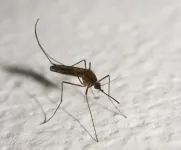The meat of the matter: Environmental dissemination of beef cattle agrochemicals
2021-01-13
(Press-News.org) A recent Point of Reference article, "The meat of the matter: Environmental dissemination of beef cattle agrochemicals," published in Environmental Toxicology and Chemistry, points at synthetic chemical cocktails being emitted from cattle feed yards into the environment and how they can impact our ecosystem and our health.
Industrial meat production facilities have a bad reputation for their impact on the environment. Concentrated animal feeding operations (CAFOs) are known to release greenhouse gases related to global warming and for discharge of manure to watersheds, which affects water quality. A less publicized impact of modern beef production is the excessive use of pharmaceuticals and pesticides, which end up in the environment. The animal production agriculture sector holds the record as the single greatest consumer of antimicrobials. Dust from feed yards typically contains antibiotics, synthetic steroids (growth hormones) and pesticides. At a time, when honeybee population decline is a hot topic, it is curious that the dust emitted each day from feed yards in the US alone theoretically contains enough permethrin to kill over a billion honeybees per day.
Since many feed yards, especially those in the US, occur in arid to semiarid regions, chemicals associated with manure particles can be transported on windborne dust over large distances. As a result, open-air beef cattle feed yards may collectively represent one of the largest unconstrained and unrecognized sources of pesticide and antimicrobial emissions on earth. Humans and wildlife, including birds and mammals, may be exposed to these chemicals either directly or indirectly.
A limited number of laws and regulations addressing odors, dust emissions, and water contamination have arisen in response to complaints from people living in the vicinity of feed yards. However, no regulations address agrochemical content of feed yard dust emissions. Environmental Impact Assessment guidance for the FDA New Animal Drug Application process does not recognize particulate-driven aerial transport of drugs into the environment. Globally, regulations on the use of agrochemicals in beef production vary considerably.
The need to produce affordable, readily available, and nutritious beef is steadily increasing, but it should not be met at the expense of environmental and human health. Feed yard waste management strategies, when used appropriately, can mitigate introduction of agrochemicals into the environment but implementation can be costly. Potential ameliorative approaches may include reduced reliance on veterinary pharmaceuticals that have potential to adversely impact local and distant ecosystems, development of alternative green chemistries, integrated pest management strategies, effective waste treatment and management strategies and broader understanding of the impacts of aerial agrochemical dissemination.
INFORMATION:
ELSE PRESS RELEASES FROM THIS DATE:
2021-01-13
Our immune system is never idle. Their task is to detect and eliminate invasive pathogens, and they have no time to lose. The adaptive immune system identifies infectious organisms by recognizing foreign proteins on the surfaces of bacteria, viruses and unicellular protozoans. The interaction of these antigens with immune cells triggers a series of downstream events, which in most cases leads to the elimination of the pathogen.
But pathogenic organisms have developed strategies that enable them to escape detection by the immune system, and the strategies employed by remotely related organisms are often remarkably similar to each other. One way of confusing the immune system is to increase the structural heterogeneity of the antigens it encounters. ...
2021-01-13
(Philadelphia, PA) - Like a failing fuel pump that causes a loss of engine power in a car, a diseased heart can take a serious toll on the body's performance. For some patients, tasks like walking up a flight of stairs or walking across a room eventually turn into exhausting endeavors. This is because, over time, regardless of the underlying cause, heart damage typically progresses, owing to a constant barrage of oxidative stress and toxic lipids that alter heart cell energetics and, ultimately, the ability of the heart to function normally.
Oxidative stress occurs when harmful oxygen-containing molecules outnumber helpful antioxidants, leading to damaging reactions with proteins, DNA, and other cell components. ...
2021-01-13
New data released this week by Australian researchers reveals the impact of the COVID-19 lockdown period on aeromedical retrievals in rural and remote regions.
Researchers say while the social isolation measures led to a reduction in overall aeromedical activity during the lockdown in 2020, once the restrictions were lifted, evacuations increased significantly.
These findings are published in the Internal Medicine Journal, comparing aeromedical evacuation trends in Australia during the pre-restriction, lockdown and post-restriction periods last ...
2021-01-13
A Simon Fraser University study on public perceptions of police officers wearing personal protective equipment (PPE) during the current pandemic finds that most PPE renders positive perceptions of police, while some equipment, including full-face respirator masks, may be viewed more negatively. The research was published January 9 in the Journal of Experimental Criminology.
Led by SFU criminology assistant professor Rylan Simpson and MA student Ryan Sandrin, the online experimental study drew on a sample of 117 participants residing in North America. The participants were randomly assigned to read one of three fictitious news articles that were either pro-PPE (highlighting health benefits), neutral or anti-PPE (lacking health benefits). Participants were then asked to rate 12 ...
2021-01-13
The Granzyme B (GzmB) enzyme, which accumulates in certain tissues as we age, has been identified as a driver of itchy and sometimes life-threatening autoimmune conditions known as pemphigoid diseases (PDs), which cause blistering and skin erosion below the skin's surface.
New research led by University of British Columbia (UBC) and Vancouver Coastal Health Research Institute (VCHRI) scientists has found that a gel containing a specific and potent inhibitor of GzmB activity, VTI-1002, resulted in significant improvements on skin affected by PDs.
"Blisters caused by these conditions can be extremely discomforting, unsightly and ...
2021-01-13
A proton exchange membrane fuel cell is a chemical cell that converts energy released when a substance reacts into electrical energy with zero emission. It is an excellent substitute for fossil fuel.
However, low activity and stability of the Pt-based catalysts in the oxygen reduction reaction (ORR) of the battery cathode restricted the output power and the number of charge and discharge cycles, thus increasing the cost of the whole fuel cells. The preparation of cathode catalysts with high activity and stability is a difficult problem.
In a study ...
2021-01-13
Durham, NC - A new study reported in STEM CELLS reveals a unique population of skeletal stem cells (SSCs) that function during the transitional period between rapid bone growth and bone maintenance. This discovery provides an opportunity to determine whether alterations in the SSCs' pattern might affect bone formation, as well as helps us understand the physiological factors that regulate its timing.
"This is particularly important given that anything that interferes with the proper development of bone mass during childhood and adolescence has long-lasting effects on our health, including the development of osteoporosis ...
2021-01-13
BINGHAMTON, NY -- A new leader takes office and foreign rivals begin to test the waters. How tough is this new leader? Are they willing to risk war, or just full of bluster?
This testing can escalate crises, increasing the risk of war as international adversaries gauge the new leader's willingness to use force. A new paper co-written by faculty at Binghamton University, State University of New York shows that when this "turnover trap" occurs depends a good deal on the politics back home, and the nature of the leader's transition into office.
Binghamton University Associate Professor of Political Science Amanda Licht was among ...
2021-01-13
AURORA, Colo. (Jan. 13, 2021) - Mucus in the lungs can be fatal for asthma patients, but scientists at the University of Colorado Anschutz Medical Campus have broken up those secretions at the molecular level and reversed their often deadly impacts.
In a study published Monday in the journal Nature Communications, the researchers explained how they created an inhaled treatment that disrupted the production of excess mucus by reducing disulfide bonds in mice and opening up their airways. The same treatment had similar impacts on human mucus samples.
"Currently about 10% of the population has asthma," said the study's lead author Christopher Evans, PhD, professor of Pulmonary Sciences & Critical ...
2021-01-13
A common bacterial species naturally infecting mosquitoes may actually be protecting them against specific mosquito pesticides, a study has found.
Wolbachia - a bacterium that occurs naturally and spreads between insects - has become more frequently used in recent years as a means of controlling mosquito populations.
Scientists at the University of Reading, and the INBIOTEC-CONICET and the National University of San Juan in Argentina, studied the effect of Wolbachia on a common mosquito species and found those carrying the bacteria were less susceptible to widely used pesticides.
Dr Alejandra Perotti, an Associate Professor in invertebrate biology at the University of Reading, and a co-author of the study, said: "This shows the importance of looking more ...
LAST 30 PRESS RELEASES:
[Press-News.org] The meat of the matter: Environmental dissemination of beef cattle agrochemicals


